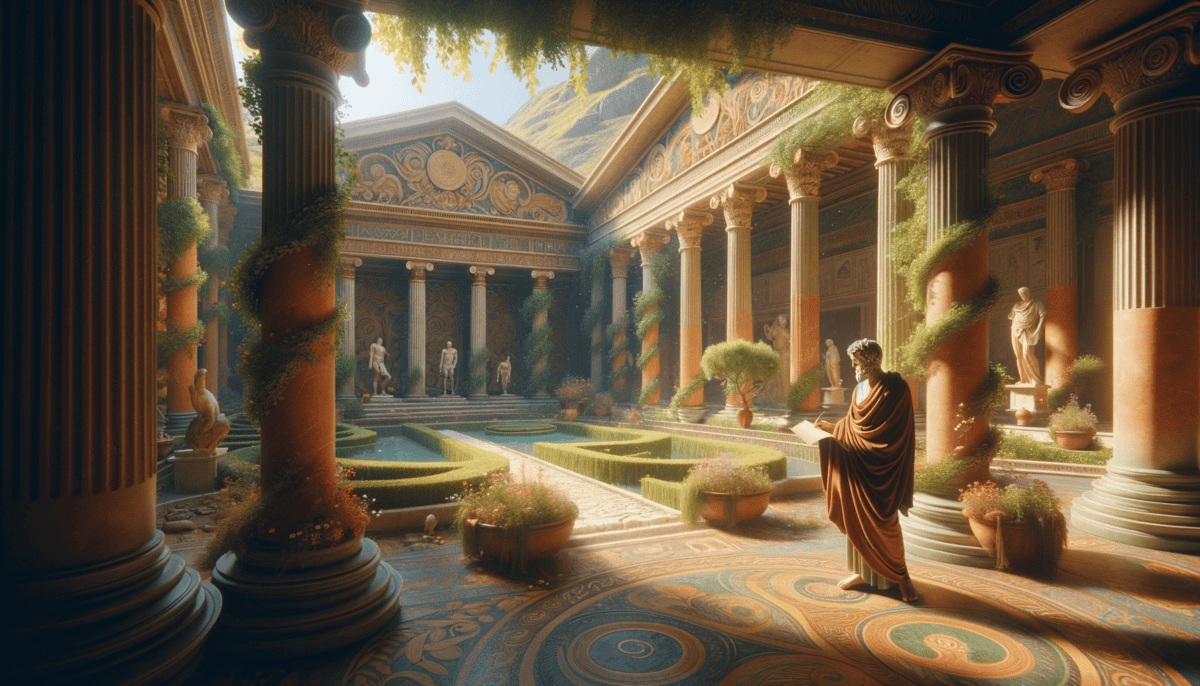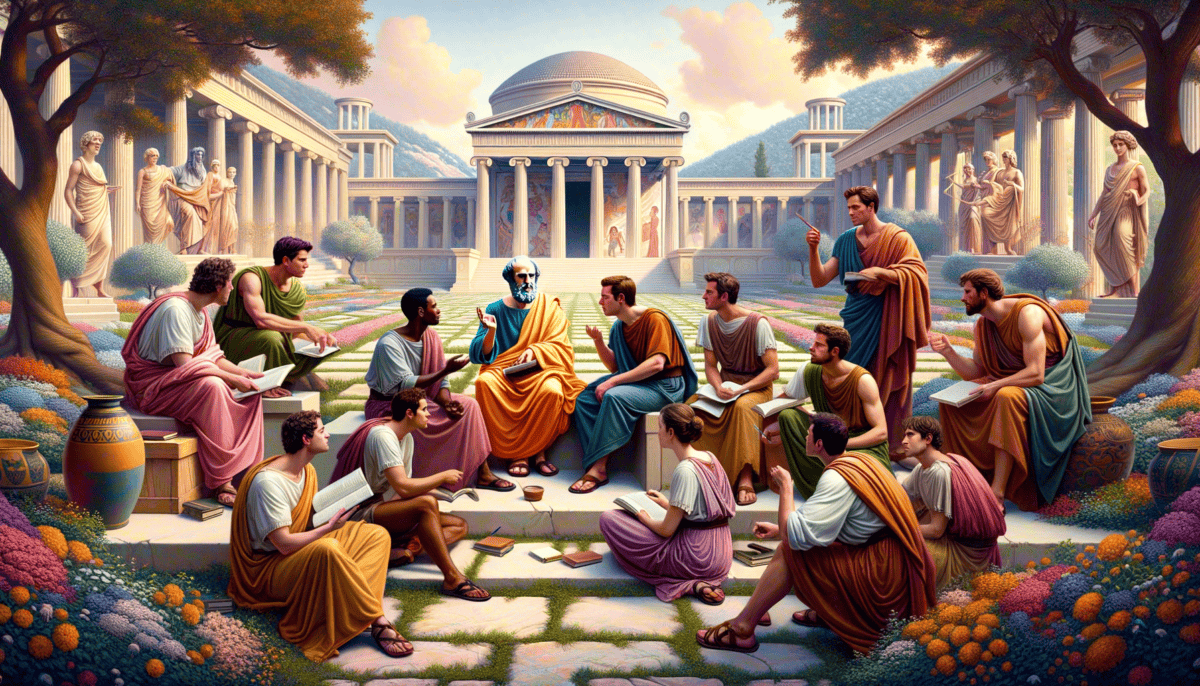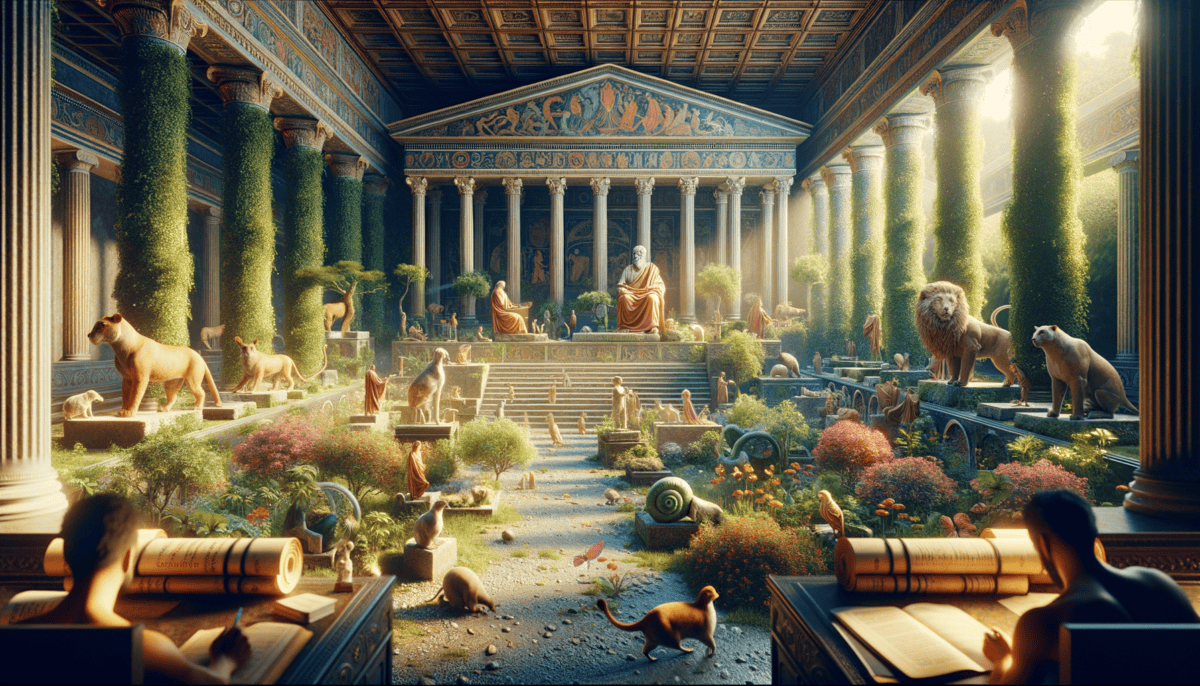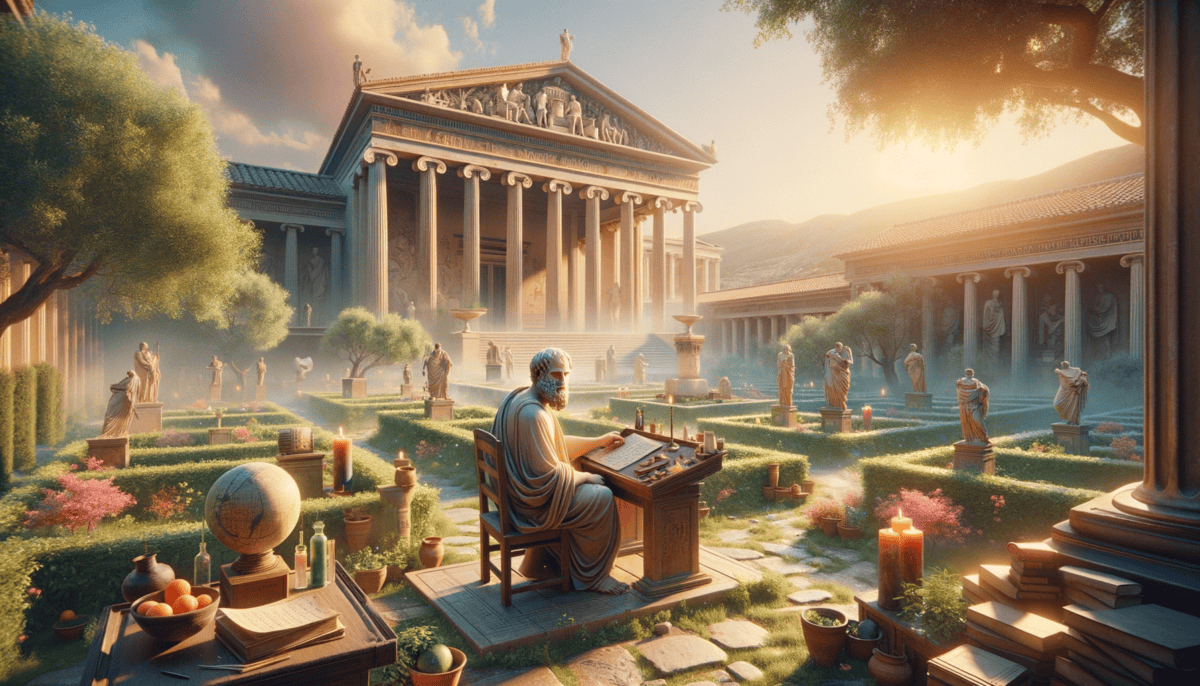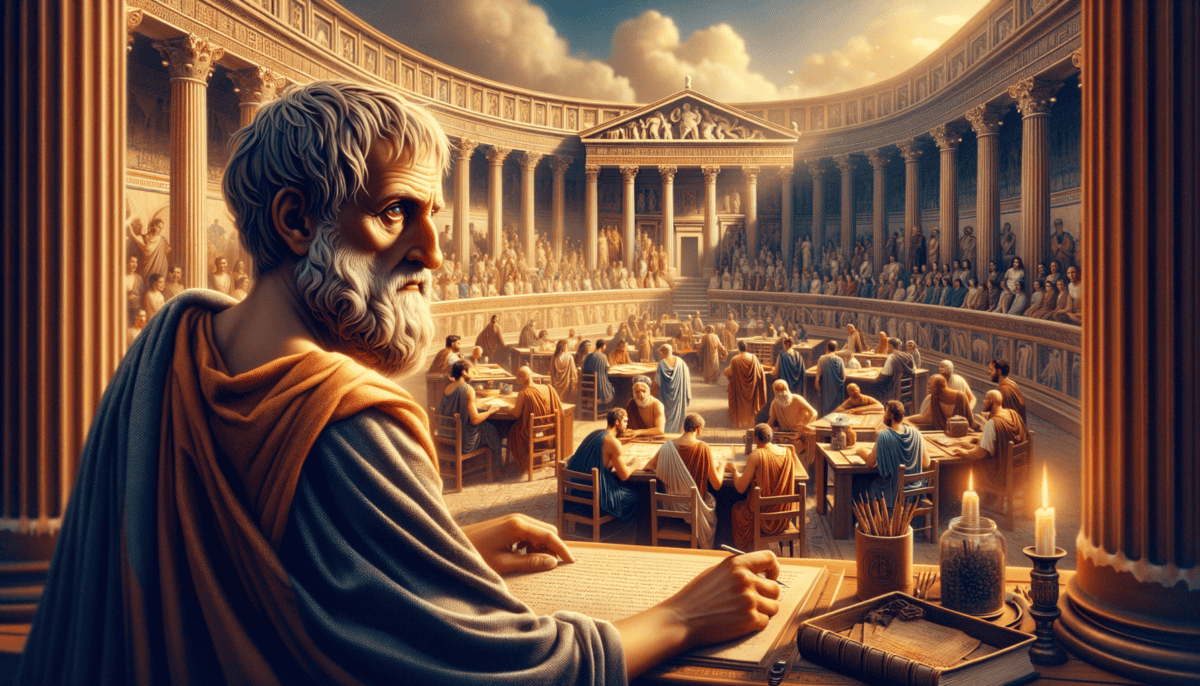The Young Dreamer
In a small town called Stagira, near the sea in ancient Greece, lived a curious boy named Aristotle. The sun was rising over the hills as young Aristotle sat in his family's garden, watching tiny ants march in a line.
"Look how they work together!" he whispered to himself, his eyes sparkling with wonder.
Aristotle wasn't like other children. While they played games in the street, he spent hours watching butterflies emerge from cocoons and counting the petals on flowers. His father, a doctor, noticed this special interest.
One bright morning, Aristotle's father found him drawing pictures of different leaves he had collected.
"Why are you doing that?" his father asked.
"Each leaf is different," Aristotle replied. "I want to know why some are big and others are small. Why some are smooth and others rough."
His father smiled. "That's what makes you special, my son. You don't just look at things – you really see them."
As Aristotle grew older, his questions grew bigger. He wanted to know why birds could fly, why fish could breathe underwater, and why the stars moved across the night sky. ⭐
When he was seventeen, something amazing happened. Aristotle got the chance to study at a famous school in Athens called Plato's Academy. Plato was one of the wisest teachers in all of Greece.
“Knowledge starts with wondering about the world around us,” Plato told his students. These words made Aristotle’s heart jump with excitement.
At the Academy, Aristotle learned new ways to think about his questions. But he didn't just want to think about things – he wanted to discover how they really worked.
A Special Discovery
One rainy afternoon, while other students stayed inside, Aristotle made an important discovery. He noticed that raindrops always fell straight down, never sideways or up. This made him think about why things fall the way they do.
"Everything in nature follows rules," he told his classmates. "If we watch carefully enough, we can learn what these rules are!"
His friends were amazed. No one had thought about it quite like that before. ️
Every day, Aristotle wrote down what he saw:
• How plants grew toward sunlight
• How animals cared for their babies
• How clouds changed shape before rain
His notebooks filled up with drawings and words. He was becoming more than just a student – he was becoming a scientist!
Young Aristotle stayed at Plato's school for twenty years. He learned from the wisest teachers and asked the biggest questions. But this was just the beginning of his amazing journey to understand the world in a whole new way.
His mind was full of dreams about discovering nature's secrets. Little did he know that these dreams would one day change how everyone thought about the world around them.
Breaking New Ground
The morning sun cast long shadows across the marble steps of Plato’s Academy as Aristotle packed his scrolls and tools. After twenty years of learning, it was time for a new adventure.
“But where will you go?” asked his friend Xenocrates.
“Everywhere!” Aristotle’s eyes sparkled. “There are so many things to learn about our world.”
With a small bag of tools and lots of blank scrolls, Aristotle began his journey. He visited islands, climbed mountains, and walked through forests. But this wasn’t just a fun trip – he was on a special mission!
The Nature Detective
Everywhere Aristotle went, he looked for clues about how nature worked. He was like a detective, but instead of solving crimes, he was solving nature’s mysteries!
“Look at this shell,” he would say to local fishermen. “Why do some sea creatures have hard shells while others don’t?”
He made lists of everything he saw:
- Fish with scales
- Birds with different beaks
- Plants that grew in salt water
- Animals that came out at night
But Aristotle did something no one had done before. Instead of just writing down what things looked like, he asked WHY they were that way.
One day, while watching dolphins play in the sea, Aristotle made an exciting discovery.
“These animals breathe air like we do!” he exclaimed. “They’re not fish at all!”
The local sailors laughed. “Of course they’re fish – they live in the water!”
But Aristotle knew he was right. He had watched carefully and seen the dolphins come up for air. This was his special way of learning – by really looking at things instead of just believing what others said.
Writing It All Down
Every night, by the light of an oil lamp, Aristotle wrote in his notebooks. He drew pictures of the animals he saw and wrote down how they behaved. He was creating the world’s first science books!
Some people didn’t understand what Aristotle was doing.
“Why do you spend so much time watching insects?” they asked.
“Because every tiny creature has a story to tell,” he would answer. “And if we listen carefully, we can learn amazing things!”
As the years passed, Aristotle’s notebooks filled up with discoveries. He was learning things about nature that no one had ever known before. But he wasn’t just keeping this knowledge to himself – he had a bigger plan.
“We need a special place,” he told his friends. “A place where people can learn about the world by watching it carefully, just like I do.”
This idea would grow into something amazing – but that’s a story for another day!
A New Way of Learning
The sun was rising over Athens when Aristotle walked through the olive groves. He had found the perfect spot for his new school.
“This will be more than just a school,” he said to his friend Theophrastus. “It will be a place where we discover nature’s secrets!”
But Aristotle had a different idea about exercise. He thought people could exercise their bodies AND their minds at the same time!
Walking and Talking
“Why do we need to sit still to learn?” Aristotle asked his students. “Let’s walk and talk!”
And that’s exactly what they did. Instead of sitting in chairs all day, Aristotle’s students walked with him through the gardens. They looked at plants, watched birds, and talked about what they saw.
“Look at this flower,” Aristotle would say. “Why do you think it turns to face the sun?”
The students loved this new way of learning. It was like going on an adventure every day!
Everyone’s a Scientist
At the Lyceum, everyone helped with research. Some students counted flower petals, while others watched how ants built their homes.
“Each of you has special eyes,” Aristotle told them. “You might see something no one else has ever noticed!”
The students worked in teams. They had special jobs:
- Plant Watchers – studied how plants grew
- Animal Trackers – watched animal behavior
- Weather Watchers – recorded daily weather
- Star Gazers – studied the night sky
A Library of Knowledge
Every discovery was written down in big books. The Lyceum soon had the biggest collection of nature books in the world!
“Why do we write everything down?” a new student asked.
Aristotle smiled. “So others can learn from what we find. Knowledge grows when we share it!”
News about the special school spread quickly. People came from far away to study with Aristotle. They wanted to learn his way of looking at the world.
“But what makes your school different?” visitors would ask.
“We don’t just read about things,” Aristotle would answer. “We look, we touch, we count, we measure. We find out for ourselves!”
The Lyceum wasn’t just a school – it was the world’s first research center. And it was about to make some amazing discoveries!
Amazing Discoveries
The morning sun sparkled through the trees as Aristotle and his students began their daily walk. Today was special – they were going to share their biggest discoveries!
Animal Families
“Look at these drawings,” Aristotle said, showing his students pictures of different animals. “What do you notice?”
A young student raised her hand. “Some animals have similar parts!”
“Yes!” Aristotle smiled. “Just like human families look alike, animal families do too!”
“We can group animals by how they look and live. Some have feathers, some have fur, and some have scales!”
Ocean Secrets
The team made special trips to the seashore. They found amazing things about sea animals!
“Did you know dolphins breathe air like we do?” Aristotle asked his excited students. “And baby whales drink milk from their mothers!”
Nature’s Patterns
The students kept careful notes about everything they saw. They made an exciting list of what different animals do:
- Birds build nests in spring
- Bees dance to tell about flowers
- Spiders spin webs in special ways
- Ants work together to build homes
Plant Mysteries
The garden became a special place for learning about plants.
“Every plant starts as a tiny seed,” Aristotle showed his students. “But look how different they become!”
They watched seeds grow into flowers, vegetables, and trees. They counted leaves and measured how tall plants grew.
New Ways to Learn
Aristotle taught his students to be careful watchers. “Don’t just look once,” he said. “Look many times to be sure!”
They learned to:
✓ Watch carefully
✓ Write everything down
✓ Check their work
✓ Share what they learn
The Lyceum became famous for its discoveries. People everywhere wanted to know what Aristotle and his students would find next!
But not everyone was happy about these new ideas. Some people in Athens didn’t like that Aristotle was teaching different things from what they believed…
Standing Strong
Dark clouds gathered over Athens. Aristotle stood at his favorite spot in the Lyceum garden, watching the storm brew – both in the sky and in the city. ️
Angry Voices
“Teacher, why are they mad at us?” asked Maria, one of his youngest students.
“Some people don’t like new ideas,” Aristotle said kindly. “They want things to stay the same.”
“But we must keep learning and asking questions. That’s how we grow smarter!”
Brave Hearts
The city leaders called Aristotle to a big meeting. They wanted him to stop teaching his new ideas about animals and nature. ️
“What you teach is different from our old stories,” they said.
“Yes,” Aristotle answered bravely. “Because we look at things carefully and learn what is true.”
Friends Help Friends
The students at the Lyceum didn’t give up. They helped Aristotle save their work:
- They copied their books about animals
- They drew pictures of their findings
- They shared their ideas with other schools
- They kept watching and learning
Safe Places
Some people wanted Aristotle to leave Athens. He knew he might have to go away for a while.
“Will you close the Lyceum?” asked a worried student.
“No,” Aristotle smiled. “The Lyceum will stay open. Knowledge is stronger than fear.”
Never Stop Learning
Even with all the problems, Aristotle kept teaching. He told his students:
“Keep watching the world
Keep asking questions ❓
Keep writing what you learn
Keep sharing with others ”
The hard times made Aristotle and his students stronger. They learned that new ideas might scare some people, but the truth was worth fighting for.
As the storm clouds began to clear, Aristotle knew that his work would live on, changing how people thought about the world forever…
The Flame That Never Dies
The sun rose over Athens one special morning. Aristotle walked through the Lyceum gardens, touching the plants he had studied for so many years.
Seeds of Knowledge
“Look, Teacher!” called Marco, holding up a scroll. “A letter from Egypt! They want to know about our animal studies.”
Aristotle smiled. His ideas were spreading like seeds in the wind.
“Knowledge grows when we share it,” Aristotle said. “Like a garden that gets bigger and bigger.”
The Big Story
Students gathered around as Aristotle showed them something special. It was a big book with all their work about:
- Animals they watched
- Plants they grew
- Stars they counted
- Questions they answered
Happy Surprises
“Our work will help people learn for many, many years,” Aristotle told his students.
The Best Gift
A little girl named Sofia tugged on Aristotle’s sleeve. “Teacher, what’s the most important thing you learned?”
Aristotle knelt beside her and said:
“To look closely
To ask why ❓
To find answers
And never stop trying! “
Forever Growing
The Lyceum became more than just a school. It was a place where:
• People learned to watch and think
• Friends worked together to find answers
• New ways of learning started
• Knowledge spread everywhere
The Story Lives On
Years and years later, people still use Aristotle’s special way of learning. When you look closely at a butterfly, count the petals on a flower, or wonder why the sky is blue, you’re doing what Aristotle taught!
“Every time someone asks ‘why?’ and looks carefully for answers, Aristotle’s flame burns brighter.”
The Lyceum may be old now, but its spirit lives in every classroom, laboratory, and curious mind. Aristotle showed us that anyone can be a scientist – all you need is wonder in your heart and questions in your mind.
And somewhere, in a garden much like the Lyceum’s, a child looks up at the stars and asks “why?” – just as Aristotle did so many years ago… ✨


